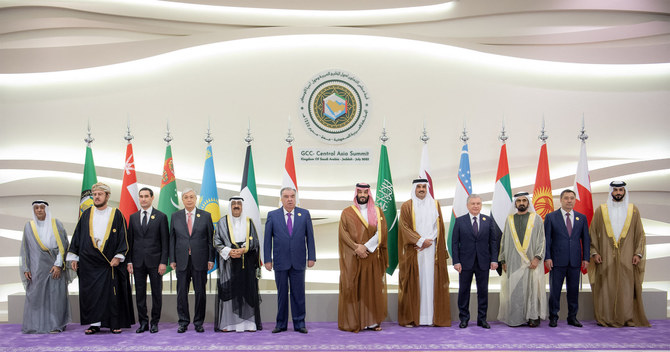As bloc pledges to ‘complement, rather than compete’ in diversification push, Davos.
THE GCC countries have reaffirmed their position of complimenting each other as they push to achieve a GDP of $6 trillion by 2050, the six-member bloc said at the World Economic Forum in Davos. Efforts made by the GCC states to diversify their economies are complementary rather than competing in the bloc, as the region continues to post strong growth, officials said on Tuesday.
The six-member bloc, which has a gross domestic product of $2.3 trillion a year, is moving towards being a $3 trillion GDP per annum economic zone by 2030, rising to $6 trillion by 2050, said Sheikh Salman bin Khalifa Al Khalifa, Bahrain’s Minister of Finance and National Economy.
“The pie currently is growing so fast that competition is not even on the table,” Sheikh Salman said. “Everybody’s trying to grow their service sectors, grow their participation, grow their GDP, and there’s a lot of synergistic benefits.”
Sheikh Salman gave the example of tourism, where countries are involved in joint marketing, supporting the region as a whole. “Growth across the region is being driven by sound policy, excellent execution and by making sure that we are simplifying doing business and a very rapid decision making process,” he said. “And we are seeing the results.”
His point was echoed by Qatar’s Minister of Finance, Ali bin Ahmed Al Kuwari. “The pie is growing. I don’t think we compete, we complement each other,” Mr Al Kuwari told the panel. “This is what we see.”
The GCC is expected to post growth of 3.6 per cent and 3.7 per cent in 2024 and 2025, the World Bank said in November. That is much higher than the lender’s forecast of 2.4 per cent growth globally for this year. Growth in the bloc is mainly being led by the non-oil sector, which is projected to expand by 3.4 per cent in the medium term “supported by sustained private consumption, strategic fixed investments and accommodative fiscal policy”, the World Bank said.
“I think the most important thing in a turbulent world today is political stability, long-sighted vision, consistency in those policies and also in the regulations,” said Khalid Al Falih, the Saudi Minister of Investment. “And the world today is longing for a combination of that economic stability, political leadership and stability, infrastructure – physical and digital, capital and a private sector in the region that we’re very proud of. “Companies in Saudi Arabia and the rest of the GCC have risen to become global leaders … and they’re a big magnet to bring investors.”
The GCC signed a free-trade agreement with South Korea to boost trade and economic ties between the six-member bloc and Seoul in December, after signing a similar agreement with Pakistan in September. It is also in talks for an FTA with the UK.
The GCC is attracting FDI at more than twice the average rate around the world when you normalise it for GDP, Mr Al Falih said. “And I believe we are at an inflection point where that’s going to increase and we’ve seen it in Saudi Arabia,” he said. The kingdom, which is projected to account for half of the GCC’s GDP growth in the future, is diversifying its economy under its ambitious Vision 2030 agenda.
Saudi Arabia is studying every sector of the economy and has specific targets for each, with a focus on providing the required assets, human talent and access to markets, Mr Al Falih said. “Based on that we find the right partners, we find the right investment scheme, with the right long-term line of sight, and we invest for those long-term journeys,” he said.
“If the private sector can do it on its own, our role as a government is to provide the ecosystem, to provide the regulation, to provide the financial framework so that they could access financial markets. “If the private sector doesn’t yet have the appetite for it, then government entities like sovereign wealth funds will step in to catalyse those sectors. They will go invest with international partners or do it on our own and then gradually exit and turn it to the private sector fully.”
The kingdom’s Public Investment Fund was the top investor among global sovereign wealth funds last year and spent $31.6 billion in 49 deals, up 33 per cent from 2022, industry specialist Global SWF said in its annual report this month. Together with the PIF, four other Gulf funds ranked among the top 10 most active deal makers last year. They were the Abu Dhabi Investment Authority, Mubadala Investment Company, ADQ and Qatar Investment Authority. While the public sector will play a key role in the region, it will be done in collaboration with the private sector, panellists stressed.
“It’s important that there is a clear, public-private partnership that has been built,” said Jasim Al Zaabi, chairman of the Abu Dhabi Department of Economic Development. “The UAE, we’ve been working hard to ensure that we are a hub for business, a hub for entrepreneurs and new economies in the future.”
Looking ahead, while the regional economy will be exposed to the geopolitical tensions, high inflation and yet-to-cool interest rates, a key area of focus will be technology, particularly artificial intelligence, and its impact on different industries, panelists said. Meanwhile, the World Economic Forum in Davos, started on January 15 and is expected to end on January 19,2024.
By Desmond Nleya Stay up to date with the latest news. Follow Daily Times on instagram Channels.


